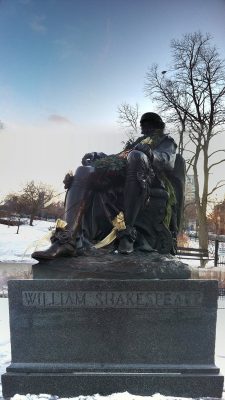William Shakespeare is widely considered the greatest English writer in history. He was an actor and a poet, but he is most famously known as a playwright. He wrote 38 plays with 10 histories, 12 tragedies, and 16 comedies. These plays have been translated into many languages and, among all the plays by all playwrights, are the most frequently performed throughout the centuries and in various countries.
Shakespeare lived around 400 years ago, but the centuries have only added to his fame. He is one of the most popular writers today and has certainly shaped the words we use and the popular culture surrounding us.
His plays can be grouped into three kinds. He wrote about historical persons like Henry VI and Julius Caesar. He penned comedies like A Midsummer Night’s Dream and Much ado About Nothing. Lastly, he wrote Hamlet, and Romeo and Juliet, which are tragedies. These last two plays contain disastrous endings and death. Hamlet is one of Shakespeare’s most well-known plays. Many actors yearn for the opportunity to play Hamlet and deliver the immortal line, “To be or not to be, that is the question.” Romeo and Juliet is another famous play by Shakespeare. It is about two ill-fated lovers and their painful love story, which has captivated the imaginations of romantics throughout the centuries. Many actors also dream of landing the roles of these two lovers and testing their craft against the genius of Shakespeare.
Shakespeare’s legacy can be felt in today’s literature and film. Many of his works influence today’s movies. “She’s the Man” was inspired by Twelfth Night, “The Lion King” was inspired by Hamlet, and “10 Things I Hate About You” was inspired by The Taming of the Shrew.
Shakespeare is present in the everyday words that we speak or write. People today use words that Shakespeare invented and used in his plays, like “eventful,” “swagger,” and “addiction.” Shakespeare was the first-ever writer to use addiction in a neutral sense, which meant “intense predilection.” He also invented the verb form of “elbow.” In A Midsummer Night’s Dream, the word “swagger” was used for the first time, and today, it is popular with rap artists. In Love’s Labour’s Lost, he invented the word “eventful.” Here are other words that Shakespeare invented that have come into daily use in the modern world:
agile (Romeo and Juliet)
antipathy (King Lear)
critical (Othello)
dislocate (King Lear)
eyeballs (As You Like It)
horrid (Hamlet)
obscene (Richard II)
skim-milk (Henry IV, part 1)
lackluster (As You Like It)
mutiny (Julius Caesar)
Shakespeare’s works have always been taught in schools, which is why his words and his storytelling genius refuse to die. However, another reason that his works continue to dazzle modern audiences is that they are highly adaptable, and because of this, modern artists have been reinventing them to suit the contemporary world. One example of this is Nicholas Hytner’s Othello.
If Shakespeare had restricted himself to writing plays, it would have been enough to secure his immortality in the literary world. But aside from being a playwright, he also wrote captivating sonnets. Sonnets are a class of poems that contain 14 lines and have a particular rhyme scheme. Shakespeare perfected this form and wrote sonnets that examine mortality, love, time, and beauty. His sonnets are songs that use plain language to simplify the vast range of human emotions. His keen intellect makes it possible for him to use various metaphors and effective descriptions of characters. These are the qualities that make the Shakespearean sonnets immortal.
Compared to other writers, not much is known about Shakespeare’s personal life. This has led to many speculations, especially about his sexuality and relationship with his wife. However, in place of this lack of information about his life stands his imposing collection of works. His works, particularly his plays, are his legacy and remain the gold standard for literary enthusiasts, modern-day writers, and playwrights.
